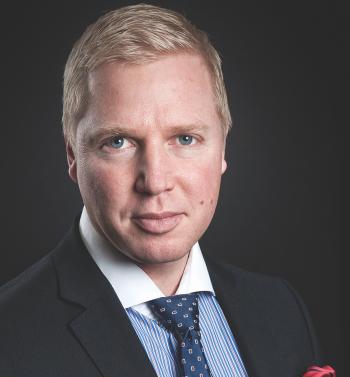By branching out into publishing, Yggdrasil has effectively licensed out of every aspect of its business. Chief executive Fredrik Elmqvist and head of publishing Björn Krantz explain why the supplier feels this will pioneer a new approach to online casino partnerships.
In 2019, Yggdrasil chief executive Fredrik Elmqvist (pictured left) had a plan for life as a listed business.
At the time, the games developer was set to be spun off from parent company Cherry, following in the footsteps of other businesses such as Betsson and NetEnt, which began life as a subsidiary of the Swedish operator.
A key element of the future plan was to divide the company into three divisions: Affiliation, Distribution and Publishing.
Publishing was arguably the most ambitious, as it would see Yggdrasil effectively make all components of its technology available to partners under licence.
In January 2020, Yggdrasil appointed Björn Krantz (pictured below right) to spearhead the division.
New Yggdrasils
The rationale behind this was so that ‘new Yggdrasils’ could develop their own games.
This could be using their own game logic to build something on Yggdrasil’s server, or using its software to build directly into their own RGS, even skinning an existing game.
“What we are doing on the publishing side is capitalising on all the fantastic assets that have been built and will be built by the company and using those assets to create another type of value proposition in the ecosystem of igaming,” Krantz explains. “We call that IP licensing.”
 However this was all contingent on the supplier spinning off from Cherry. That, of course, did not happen.
However this was all contingent on the supplier spinning off from Cherry. That, of course, did not happen.
The operator, via a private equity takeover by Bridgepoint Capital, delisted from the Nasdaq Stockholm exchange and Yggdrasil remained part of the group.
“So we said to the new board, which included representatives from Bridgepoint, ‘What can you do with this publishing arm concept?’ because they had a lot of experience with publishing in other sectors,” Krantz says.
“They said we can scale our operations and with our new value propositions we can grow with collaborating partners all over the world and there doesn’t have to be a lot more investment to do so.”
“The board said, “How big can this be then?’ and we said ‘What is preventing the Taiwanese guys or the Japanese or the Indian guys from gaining exactly the same amount of traction and success as we have done in the European market?’
“All the other partners could be as big as our current business and then we could take a revenue share on that.”
Following that discussion with the board, Krantz said Bridgepoint have been “very supportive” of the company’s ongoing business strategy and new operational structure, and “truly understand the business benefits and growth opportunities for all stakeholders”.
The Yggdrasil Publishing arm is made up of three verticals: YG Franchise, for Yggdrasil’s gaming platform and tools; YG Masters, for third-party game development and distribution; and YG Game IP for game licensing.
For Elmqvist, the appeal to potential partners is clear.
“If you are looking at investing in your products, you don’t want to use your cash flow on something that’s already been done before,” he says. “So we take what we’ve done before and licence that out.”
“Let’s say you’re a big land-based studio, you have offices in Vegas, Macau and Japan, and you know you need to go online,” Elmqvist says. “But nobody wants to start doing it.
“Someone selling a game development kit might say, ‘All you need is a GDK and you’ll be on your way’ and they put some games out and they’re embarrassed. All of a sudden, their brand is out there and it’s not performing.
“The lack of performance may not be because your content is poor, it’s because the execution is poor, the distribution is poor and the supporting tools are poor.
“But we can say to those guys, ‘We’ll help you, we can do it together.’ We can enable their game development process.”
Beyond aggregation?
At the heart of this is the development of the GATI (game adaptation, tools, and interface) solution, a language-agnostic tool that allows a studio licensing Yggdrasil IP to distribute games through the supplier’s network.
“It’s basically a container solution where a third-party studio has a set of pre-configurations which they use for building their games into the GATI,” Krantz says.
“This is a disruptive and unique way of allowing partners to quickly scale their territorial reach and deliver content globally.
“Normally, all the studios have different types of languages where they build games. The GATI is totally language agnostic, so it standardised everything.”
At its core, the GATI resembles an aggregation network, but Elmqvist and Krantz argue its decentralised nature and language agnosticism mean it is best described as a new piece of technology entirely.
“I wouldn’t even compare this to aggregation because this is beyond aggregation, it’s much more scalable,” Elmqvist says.
It’s the GATI that allows each game created through Yggdrasil’s publishing division to be distributed in a variety of different jurisdictions with different regulations, adapting all distributed games to meet compliance standards.
“When you’re adapting your game range, whether it’s one game, 50 games, 200 games, thanks to the GATI, all of a sudden they are compliant in those markets,” Krantz continues.
“For game studios and developers, if they follow all the tools and interfaces on the GATI, their games are there. They don’t have to think or to talk to all the certification guys.
If we say, “Here comes a new market, there are some new layers in the GATI they say ‘Okay, we’ll take that’ and they can update the game.”
Yet besides regulatory standards, Yggdrasil has opted to take a hands-off approach when it comes to games that will include “powered by Yggdrasil” branding.
While this will likely lead to games that differ from Yggdrasil’s current offering, Elmqvist and Krantz said they weren’t concerned about a potential drop-off in quality.
“Who are we to say visually or mechanically if a game is going to be successful or not?” Elmqvist asks. “I have seen some very ugly games that are super successful.”
“The more general thing is if the content itself is abusive or is it something that could harm our reputation,” Elmqvist says.
“There are always controls like that, but apart from those controls, people can use their imagination because they know what works best in their market.”
Competition to collaborators
Just who those partners may be could vary, with Elmqvist listing a broad spectrum of business types across the industry that may be possible partners.
“We can work with operators, other B2B suppliers, resellers, studios that want to build their own business but who lack the balance sheet to make these costly developments,” he says. “So we can do that, licence it out and get money for it.
We are looking for partners with existing operations and maybe already with a strong value proposition in their market, and they need us to facilitate scale of business growth in the local market as well as in other markets.”
For Krantz though, that list goes a step further, including suppliers that Yggdrasil may see as its rivals.
The increasing pressure from regulation and competition, Krantz says, could encourage these businesses to start working alongside Yggdrasil and using its own publishing and distribution tools.
Appealing to rivals may sound like a difficult sell, but as Krantz points out, the GATI’s streamlining of the process of achieving regulatory approval frees up plenty of time and money that can be spent on marketing instead.
But are these same costs from increased regulation and competition why Yggdrasil has had to licence out its business? With the supplier opening up a new revenue channel, it may appear that things have got too difficult in the existing ones. Krantz, however, rejects this outlook.
“Could we have continued with the business model as is, doing nothing more than today?” Krantz asks. “Of course, but it’s not what Fred and the board and the owners wanted.
“They want Yggdrasil to be a world-leading company. We could have done nothing, but ambition levels are so much higher.”
“We can grow into all these markets organically with our own distribution. Go in, get a licence. Go in, get a licence. But that’s going to be very expensive and in some markets it might not even be successful at all because we don’t always have the local knowledge there.
“So we are the enabler to create new Yggdrasils.”












